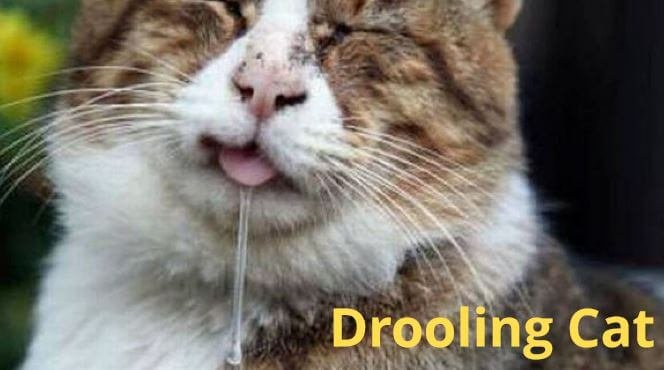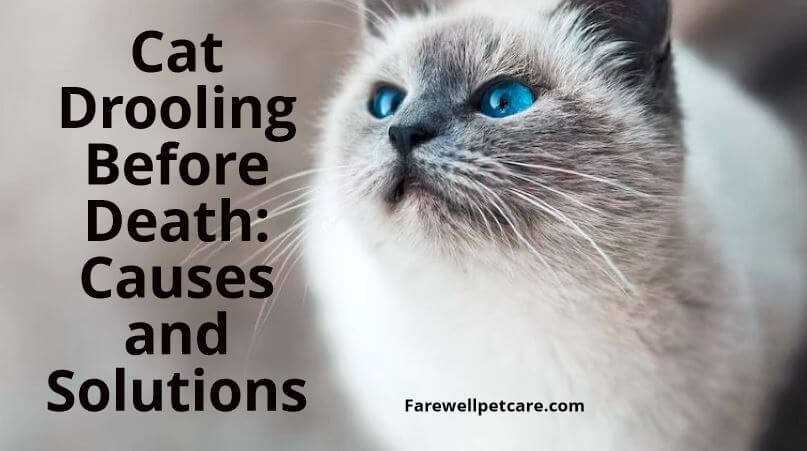The famous quote “cats rule, dogs drool” is somewhat accurate in that cats drool lightly and not so often, unlike dogs, who’re drooling creatures of habit. Therefore, instances of hypersalivation, such as a cat drooling before death, can be a cause for concern for cat owners.
A cat drooling before death can mean the organs controlling temperature are failing. Similarly, drooling can be a symptom of a seizure or an underlying medical problem in a dying cat.
If you’re wondering why your cat is drooling before death, this post is for you. Read on to learn about cat hypersalivation—the causes and what to do.
Why Is My Dying Cat Drooling?
The main reason behind your dying cat drooling is that its organs are shutting down.
When a cat approaches death, its organs, including those responsible for thermoregulation, begin to cease operating.
As a result, your cat will start drooling excessively, breathing rapidly, and showing restlessness as death approaches.
Dying cats can also drool when having a seizure. Seizures can occur severally in the last hours of life. This situation limits the cat’s ability to swallow, resulting in hypersalivation before, during, or after the attack.
Additionally, an underlying medical condition might cause drooling in your dying cat. Your feline might have mouth, liver, kidneys, digestive or neurological system issues.
Find Out: Do Cats Want to Be Alone When Dying? 8 Crucial Signs to Look For
Cat Drooling: 5 Reasons and What to Do

Although cats are not prone to slobbering, sometimes they can be little drooling machines.
Like dogs, they can drool for different reasons, some of which are grave enough to need immediate attention. However, others are comparably harmless, and the drooling will cease when you remove the trigger.
Here are the main causes of drooling in cats and their solutions:
1. Your Cat Is Happy and Relaxed
Sometimes cats water at the mouth when they’re kneading and purring. Drooling in cats is often associated with feelings of relaxation and contentment that can be tracked down to kittenhood.
Kittens knead on their mothers’ teats when nursing to stimulate milk release. Kneading causes a comforting and satisfying meal and enhances the connection between mother and kitten.
An adult cat often kneads when feeling content. This can stimulate drooling due to the nursing instinct, often accompanied by purring.
Drooling can also occur when you pet your cat or when they’re curled up on your lap. Very rarely will they salivate at the sight and smell of food, but if it happens, it’s perfectly normal and nothing to be concerned about.
Also Read: How to Comfort a Dying Cat in 6 Simple Ways
2. They’re Stressed or Anxious
Your cat can drool temporarily due to stress, fear, or nervousness. Generally, cats are not fans of change. They get worked up easily over strange, scary situations like a new house and loud noises.
Similarly, ordinary things like car rides and vet visits can heighten their anxiety levels, stimulating their salivary glands.
What to Do
Although anxiety-related drooling is usually short-lived and nothing to worry about, it can still be stressful for both of you.
If your feline looks extremely stressed regularly, consider discussing with a professional about options.
If they become anxious on long trips or you need them calm during a significant change, a vet can prescribe short-term anti-anxiety drugs to keep them calm and prevent stress-drooling.
If possible, get your cat from the stress-inducing situation to a safe place. They’ll most likely stop drooling when they feel safe.
Some common cat stressors include:
- Unexpected people
- Strange smells
- Mirrors
- Conflicts between two cats
- Outdoor distractions
- Excessive affection
3. They’ve Ingested Something That Tastes Bad
Your feline can hypersalivate if they eat something that tastes bad, including medications.
Generally, cats will throw up if they take in poison. But if they simply ingest something unpleasant, they’ll drool to eliminate the taste. Some drugs, such as painkillers, can also cause excessive salivation as a side effect.
An unpleasant taste can make your kitty nauseous. So observe them closely to ensure they don’t vomit.
What to Do
This issue will eventually stop by itself. But to help eliminate the bad taste quickly and prevent them from throwing up, you’ll want to offer your cat some food, water, or treats.
4. They’ve Ingested Something They Shouldn’t Have

Cats can be fussy eaters but like putting things in their mouths. They love to nibble on plants, toys, grass, bones, sticks, etc. These things can get stuck in the mouth or throat, challenging swallowing. This leads to a build-up of saliva, causing drooling.
Getting foreign material lodged in their throat isn’t the only risk. Houseplants such as caladium, dumb cane, and elephant ear have tiny, sharp needle-like crystals that can embed in your kitty’s lips, tongue, or throat, causing pain and drooling.
Furthermore, some houseplants and chemicals like cleaning products and insecticides are highly toxic when ingested. They’ll likely irritate the stomach, causing hypersalivation.
What to Do
You can remove larger objects stuck in the mouth by hand but take great care as a cat in pain can bite.
If you suspect your kitty has something lodged in its food tract, it’s best to get them checked by a vet immediately. The cat may require sedation or even surgery to remove the foreign body.
If you catch your feline snacking on a toxic substance, contact your vet or Pet Poisoning Helpline immediately to be advised on the best course of treatment.
Some toxins can be expelled by vomiting, while medications can counteract the effect of others.
It’s also best to prevent this potential menace altogether by keeping only cat-friendly houseplants. Always check with a cat expert if a plant is poisonous before putting it in your house or garden.
Additionally, always keep poisonous chemicals locked safely in a cupboard.
5. Your Cat Has a Health Issue
Sometimes your feline’s hypersalivation indicates an underlying medical condition, such as:
- Oral Health Problems: Dental diseases are common in cats. Studies show that about 85% of cats three years and above suffer from dental issues such as tooth decay, gum diseases, and oral infections. Cats with dental problems drool excessively due to pain and inflammation.
- Nausea and Gastrointestinal Issues: Cats can excessively salivate in response to nausea due to gastrointestinal problems like gastritis, inflammatory bowel disease, gastrointestinal ulcers, and cancers of the digestive system.
- Respiratory Problems: Respiratory infections, such as upper respiratory infections (URIs), causes congestion and difficulty breathing in cats. Consequently, this leads to excess saliva production and drooling.
- Neurological Conditions: Neurological disorders like brain tumors can affect a cat’s ability to swallow and control saliva production. This might lead to excessive drooling.
- Kidney and Liver Disease: Issues with the kidney and liver cause toxin build-up in the body and can trigger nausea, hence drooling. Kidney disease can also cause ulcers in your cat’s mouth. These painful sores can cause drooling.
- Trauma in the Mouth: Sometimes drooling can suggest injury in the mouth due to an accident. It can include broken teeth, fracture in the jaw, or oral burn from chewing an electric cable.
- Heat Stroke: If your feline’s body temperature shoots dangerously high, they’ll likely start to drool excessively, pant, and vomit, among other symptoms due to heatstroke.
What to Do
You’ll want to visit a vet if you suspect your cat’s drooling is due to an underlying health condition. The veterinarian can spot the problem through various examinations and provide the best treatment.
Ensure to provide the vet with your feline’s complete medical history to help figure out possible underlying causes for your cat’s hypersalivation.
Do Cats Drool When in Pain?
Cats drool when in pain due to trauma in the mouth or underlying medical problems. Abnormal drooling in cats is often associated with oral pain but can be a symptom of general pain elsewhere.
Unfortunately, felines are programmed to hide pain well, resulting in vague signs. This makes evaluation a challenge. Other general pain symptoms in cats include aggression, behavior changes, inadequate grooming, and hiding.
Final Thoughts
Cats drool for various reasons. A healthy, happy cat will likely drench you with saliva during snuggling or petting sessions. Occasional drooling might indicate stress.
It is best to see a veterinarian if your cat:
- Suddenly begins drooling
- Drools constantly
- Exhibits other signs of illness like vomiting, fatigue, lack of appetite, panting
- Acts differently than usual
- Has blood in the saliva

